KAROLINE KAN, IN ZHANGJIAKOU
It’s approaching 6pm on the outskirts of Dajingmen Square, in the center of Zhangjiakou. There is a sense of expectancy in the air – the accumulation of months of unguarded hype and government-backed publicity. Crowds are beginning to amass. Old people, families with small children, teenagers and curious office workers all jostle for space along the roadside.
Despite being neither gifted with ideal skiing conditions, nor plentiful amounts of snow, Zhangjiakou has somehow become the odds-on-favorite to secure the nomination to host the 2022 Winter Olympics. The relatively obscure satellite city, that is competing in a dual bid with neighboring Beijing, has seen rivals Oslo, Krakow, Lviv and Stockholm slowly drop out from the race, leaving just Almaty in Kazakhstan as the only other contender.
But as Beijing discovered in its failed bid to host the 2000 Summer Olympics, good odds do not guarantee success – and as the final countdown begins to the International Olympic Committee’s announcement, a police line forms around the main square, preventing the public from entering.
It’s a strange move in a city that has publicly trumpeted the games for over a year – hanging banners, running televised ads and holding concerts. Why not let the public celebrate? The reason, according to event organizer Lin Bai, is concern over the possibility that the IOC might return an unfavorable verdict. “If you are the one who makes the decisions, you’d probably do the same,” he explains, apparently unaware of the crying children in the crowd, perplexed as to why they’ve been excluded from the festivities.
“We have bad memories of 1993 – we prepared everything so perfectly, but at the last minute, Beijing failed. It was so embarrassing. We don’t want the same embarrassment and shame again.”
Banned from the square – and out of sight of the assembled media – a sizable crowd begins to form, several hundred meters away on the other side of the road. I join a group lining a bridge – the highest publicly accessible point in the immediate area – in an attempt to see the big screens that have been set up in the square especially for the event.
From my position, I am able to make out a small select audience, sat on little colored chairs, occasionally applauding in perfect unison. To the right of me, a father holds his son aloft above his head: “Can you see any better?” he asks. “No!” replies the son.
Frustrated, most people revert to watching the live broadcast on their smart phones. “This is ridiculous!” exclaims an elderly man, to no one in particular. “I came here for the ceremony. What’s the point of standing here, when I could go home and watch it on the TV?”
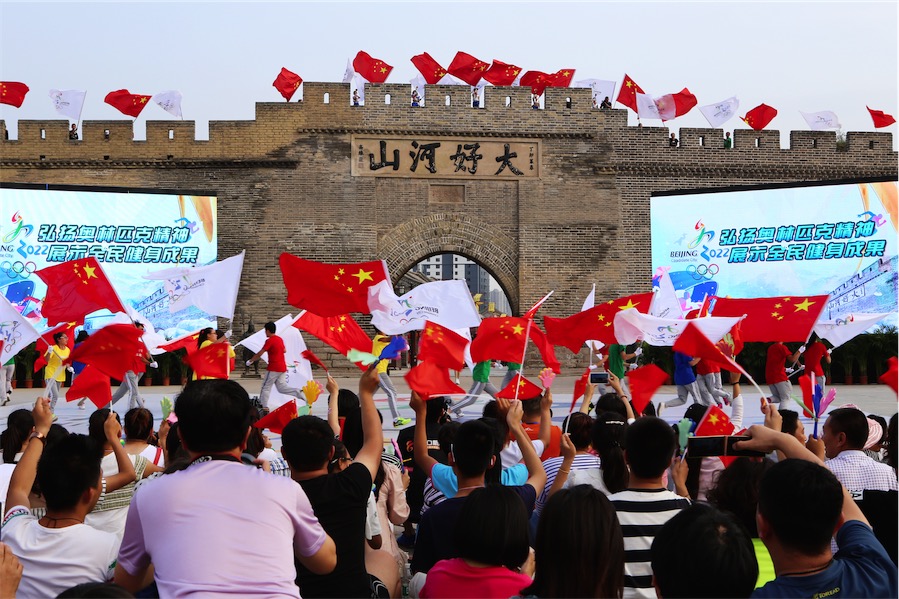
During my last trip to Zhangjiakou, just under a month before, Zhang Chunsheng, the executive director of the Zhangjiakou 2022 Winter Olympic Games Bidding Office, told me that the bid enjoyed the support of 90 percent of locals. It was, according to Zhang, one of the city’s major advantages.
Perhaps organizers feared that after months of promoting the games, a win for Almaty might result in violence from the crowd. Whatever their concerns, they needn’t have worried.
The IOC announcement is met with loud cheers from those gathered in the streets – as expected, Zhangjiakou has won.
Li Minghao, a 54-year-old taxi driver, is among numerous drivers who pull over upon learning of the news to get out of their cars and join the celebrations.
“I’m a little excited, of course! It’s the first time in history that Zhangjiakou is headline news,” says Li, of his city’s historic win. “I guess the question now, is will the house prices keep rising? And how much more money can I make!?”
In a nearby street-side BBQ restaurant, 18-year-old cook Liu Qiren is similarly enthusiastic, if low key.
“It was very exciting. When Beijing and Zhangjiakou were announced, everyone in the restaurant applauded.
Although, within 20 minutes, everything went back to normal,” says Liu.
Liu’s description of his celebration – alongside the strange scenes in the square – seem far removed from my own memories of the last time China won an Olympic bid.
In 2001, the Internet was yet to become a major presence in people’s lives, and the majority of Chinese people depended on television to get their information. Propaganda around the Olympics still held a certain emotive power – the bidding process was much greater than the simple matter of securing the rights to host the Olympics; it was a matter of national importance. Winning was a first step in restoring China’s pride and overturning the country’s sense of humiliation.
I remember clearly the moment when Juan Antonio Samaranch, the former president of the IOC, said the word “Beijing” – and how people rushed from their houses in my small Tianjin suburb, laughing and crying and overcome with jubilation: “We win! We win!”
Maybe this time, the victory came a bit too easily. As those in the crowd had explained to me earlier in the evening: “Who else apart from China has the manpower and determination to hold these Games?”
Whatever the reason, within minutes of the announcement, workmen begin packing up the official signage and deconstructing the LED screens. Event manager Lin Bin isn’t sure why everything has to be removed so quickly. “I’m just following orders from above,” he explains. “There's a strict plan we have to follow.”
.jpg)
As the night wears on, and news of the win spreads, more people begin heading to the square. Most arrive assuming there will be a big party, fireworks, singing, dancing, a screen repeating footage of the historic moment, a night without sleep – things that have never happened in Zhangjiakou before. But none of this transpires. Instead, they watch as workers dismantle an event they were barred from entering.
I meet back up with local taxi driver, Li Minghao, who by this time has grown frustrated. “For years, Zhangjiakou has been hiding behind Beijing as a little brother. I was thinking, today, finally, it could make its mark. But no. Our city doesn’t dare take the glory away from Beijing, not even today!”
Li Minghao tells me that the only positive change brought about by the win is the possibility that the government might provide him with a new taxi, “the type that uses electricity, not gas.”
As for the games itself, Li seems largely uninterested. “Skiing is not something that Chinese people do. We don’t have the tradition. And it’s so expensive that I will never be able to afford for my kid to take lessons, so what’s the point?”
As Li speaks, I can’t help but think of Zhang Chunsheng, the executive director of the Zhangjiakou 2022 Winter Olympic Games Bidding Office, who three weeks previously had told me how “the Winter Olympics will boost skiing in China, creating a potential market of 300 million.”
But who are these people, and where will they come from?
NOELLE MATEER, AT THE BIRD'S NEST
On the afternoon of July 31, uproar breaks out at Beijing’s Olympic grounds. Two fireworks shoot off. Cheers erupt. Flags wave. And then it stops.
“Damn, skiing’s going to be so much more expensive now,” says a spectator outside the Olympic Park gates.
And that was the celebration of the 2022 Winter Olympics announcement.
I had waited for the announcement in an attempt to compare 2015’s celebrations with those of 2001 – the year Beijing won the 2008 Summer Olympics host slot. Television footage from that night shows then-president Jiang Zemin smiling and waving from the walls of the Forbidden City, as the most iconic square of the People’s Republic of China teemed with the People of China.
To say a lot has changed since then is an understatement. I wasn’t in Beijing in 2001 – I was in the States listening to 98 Degrees on my cassette player – but I hoped, rather selfishly, that Beijing would win the 2022 Winter Olympics bid so that I could experience a similar celebration for myself. Instead, I ended up sipping RMB78 cocktails in the Beijing Intercontinental.
Allow me to explain. Ahead of the announcement, I’d set off for the Olympic Park, which hadn’t been built in 2001, via Line 8 of the subway, which also hadn’t been built in 2001. Then, almost immediately upon exiting the station, I was stopped by a security guard who was so young-looking, I wondered if he, too, had been made after 2001.
“The park is closed today,” he says, adding that there are important government officials inside, though he can’t tell us who. I ask if there are any other entrances at which I can enter the park. With a laudable not-my-job attitude, the guard shrugs: “You can try.”
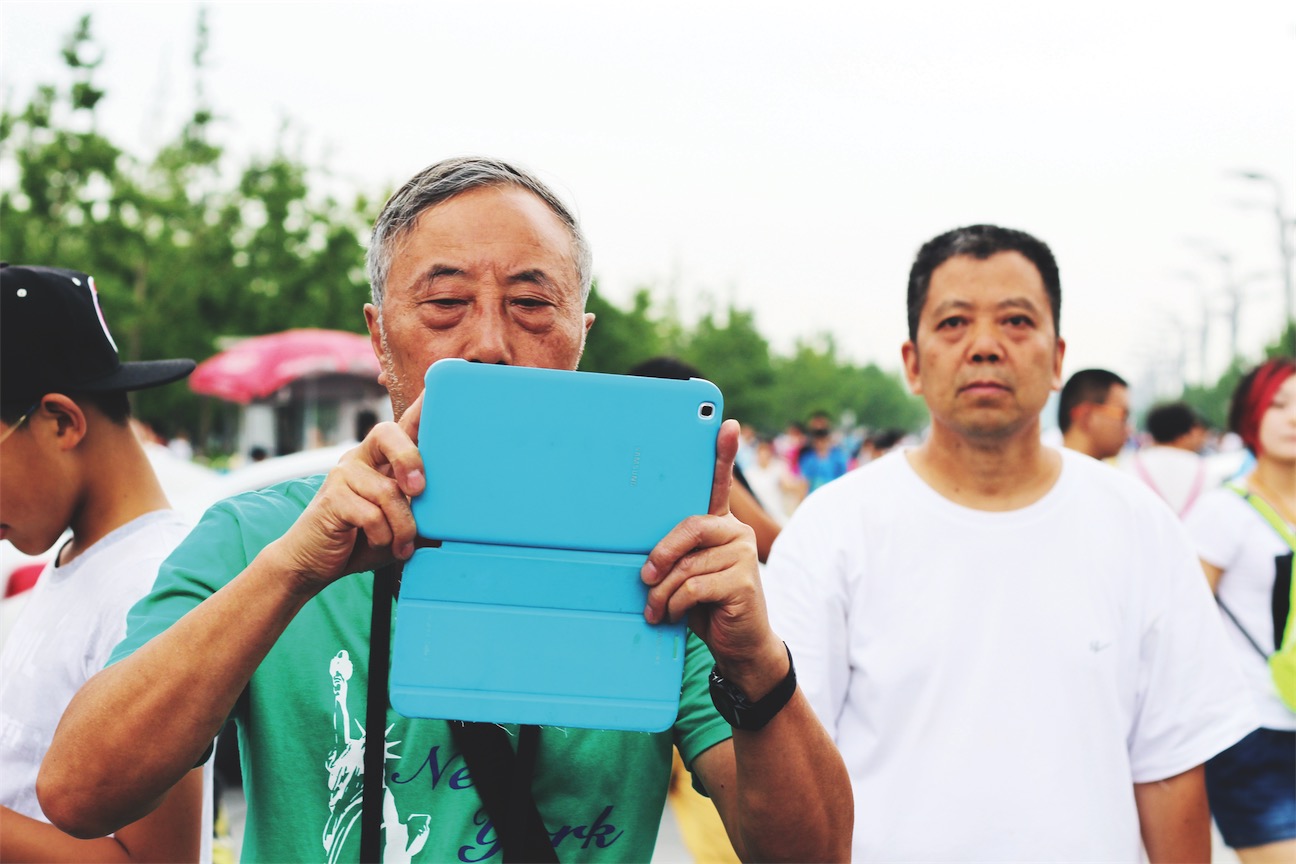
After an exhausting walk around the perimeter of the park, (“This is investigative reporting!” I tell our intern, Vanessa), I finally see proof of celebrations to come: tiny red blurs, in the distance. Flags. Music. “That’s definitely Party music,” says Vanessa.
We can’t get in, though. This isn’t a celebration for the People. And so Vanessa and I wait, peering at the edges along with a handful of fellow rubberneckers. We quickly tire. There’s nothing to see, and so, with an hour until the fateful announcement, we look for somewhere to sit.
I eye the grass in front of the Beijing Performance & Arts Center, but a fence indicates that it’s also not for the People. Then we see the Intercontinental. They’ll have wifi! we think. And so we approach.
An unusually welcoming security guard points us inward. The hotel’s air-con surrounds us like a comforting embrace. Staff usher us toward the lounge, where we sit on a couch and peruse a menu of overpriced cocktails, including, but not limited to, the ‘Bird’s Nest’ and the ‘Water Cube.’ I order a Water Cube. The fact that it comes in a giant glass cube is cool, but definitely not cool enough to warrant 78 kuai. Fuck it. I sip and gather my conclusions on Beijing 2001 v. Beijing 2015: Beijing 2015 is expensive.
We leave just in time to return to the gates for the announcement. I use my camera’s zoom to try and make out what’s going on within. When the decision is announced, I ‘woo’ with a handful of other spectators by the park gates, and then the scene dies down. One man says: “It had to be Beijing. We knew it would be Beijing.” And then the crowd begins to disperse.
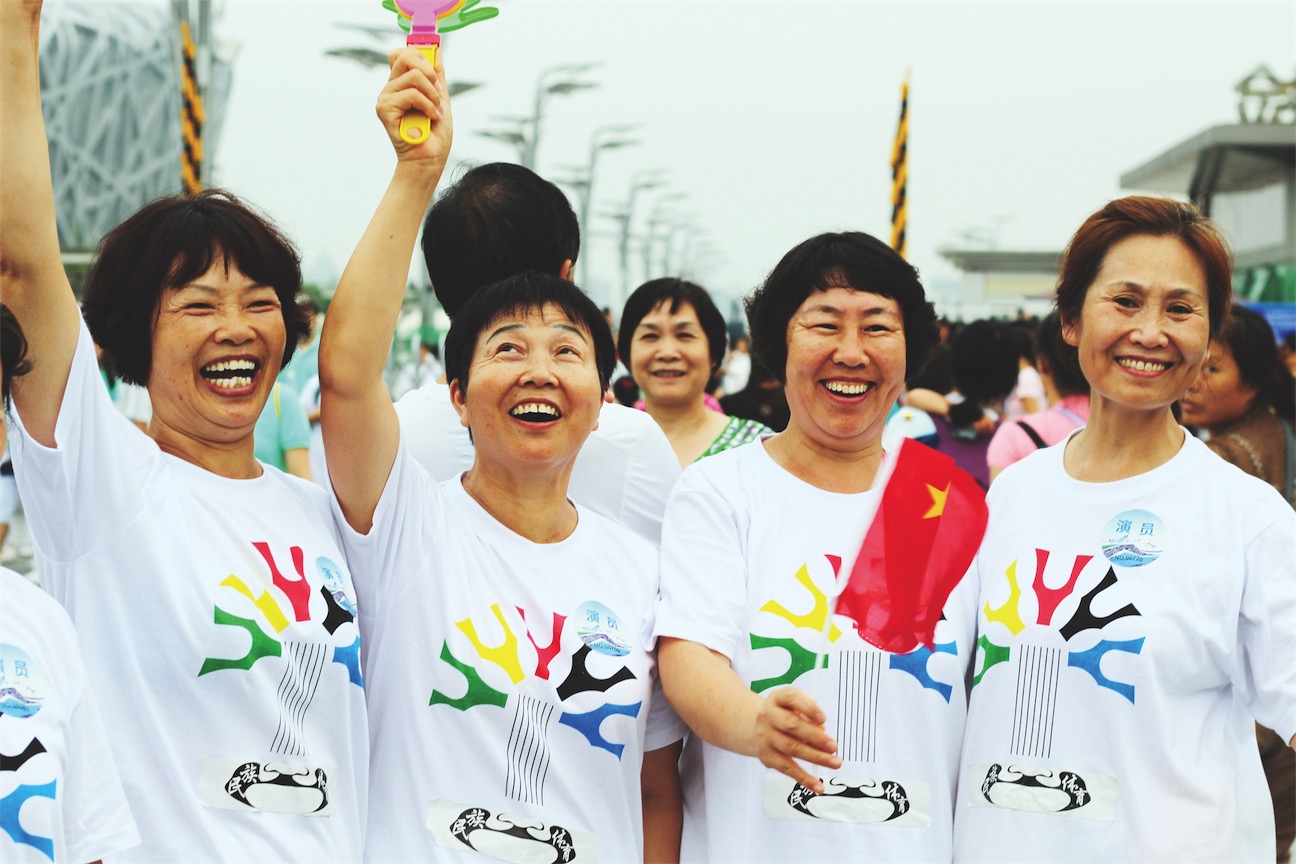
I wonder: Is everyone hanging out without me? At Tiananmen Square, perhaps? I catch the subway there, but the live news coverage streaming on the train’s TV proves I’m not missing much: a reporter is interviewing all five revelers gathered at the otherwise empty square. This has been exhausting and, frankly, kind of lame. So rather than continuing south to Tiananmen, I head east to Sanlitun, where I meet a friend for a beer.
“What announcement?” she asks, as I explain where I’ve just come from.
“Oh,” she says. “I thought we’d won that ages ago.”
OSCAR HOLLAND, AT THE KAZAKHSTANI EMBASSY
I don’t know who ‘Julie’ at the Kazakhstani Embassy is. I’m not even certain she exists. All I know is that a) she’s the person I need to ask about watching the 2022 countdown with Kazakhstan’s Ambassador to China, and b) she’s never in the office when I call.
“Call back at 4pm. Ask for Julie,” comes the initial snub, followed by the cut-and-paste response I receive on every subsequent call – “Julie not here. Call back at [insert time].”
The pattern is finally broken on the day of the IOC’s announcement. “You’ve called the wrong number,” I am told, before receiving the final, fatal blow: “We’re too busy today.” Julie’s on holiday, apparently.
All I really want is to spend the afternoon with a Kazakh. Because amid Olympics hysteria, we have neglected the underdog. Beijing’s mood of expectation – and unprecedented public support for hosting the games – makes it all too easy to ignore the credible efforts of Almaty.
Although little-fancied, the city’s bid has all the requisite ingredients: venues within a 30km radius of the city, actual snow, and a tongue-in-cheek slogan poking fun at northeast China’s shortage of the stuff (‘Keeping it Real’). So what does Beijing’s Kazakhstani community make of its chances? Do people feel torn by the rivalry between their homeland and their adopted home?
Still stinging from rejection (and with the announcement fast approaching), I make a last-ditch trip to Ritan Park. This is not simply to find people who look vaguely central Asian to interview (although I would resort to that) but because I’m in search of Beijing’s only Kazakhstani restaurant, Astana.
The short walk from Ritan Beilu is a gauntlet of international restaurateurs lurking outside their establishments like hungry ghosts with mustaches. The grizzled proprietor of an Azerbaijani restaurant tries to lure me in with a well-honed sales pitch (“Azerbaijani fooood!”) before the owner of a Turkish place tries to tempt me with a cry of “Turrrkish fooood!”
The latter gleefully informs me that the restaurant I am seeking has closed (suggesting that I might instead be interested in some “Turrrkish fooood!”). To his dismay, I press ahead and peer through the dusty glass-front of the late Astana. It looks as if the establishment was suddenly abandoned in the middle of a Nauryz feast.
I glance back at the Turkish man. He looks vindicated. But I shan’t give up my search. If I’m not able to enjoy this historic moment with a glass of fermented mare’s milk and a steaming plate of quwyrdaq, then I’ll be damned if I’m going to eat kebabs.
The embassy may be too busy to receive me, but I can always wait outside until some Kazakhs appear. There’s still about an hour until the decision is revealed, so I jump into a taxi and head to Sanlitun, furiously WeChatting friends to see who might know a Kazakh. It shouldn’t be this difficult to find someone. Even if I can’t find a Kazakhstani national I would happily talk to an ethnic Kazakh, one of China’s 56 recognized minorities. There are almost 1.5 million in the country, though, as I later discover, 85 percent live in Xinjiang.
Yet, all is quiet at the embassy. Paranoid that the guards are suspicious of my lingering, I duck into the consulate where a waiting room TV is screening the ceremony. The man at the door informs me that there are no Kazakhs inside.
I have failed. Left with nothing else but to sit and watch the decision here, I am offered some solace by the jovial consulate employee (a Hebeiren, though sadly not from Zhangjiakou) who allows me to stay in the waiting area. He is a good sport, agreeing to be photographed giving me a high-five after Beijing wins.
Perhaps most helpfully, he reveals why I may have found it so difficult to interview a Kazakh on the Winter Olympics.
“No-one here really cares that much.”
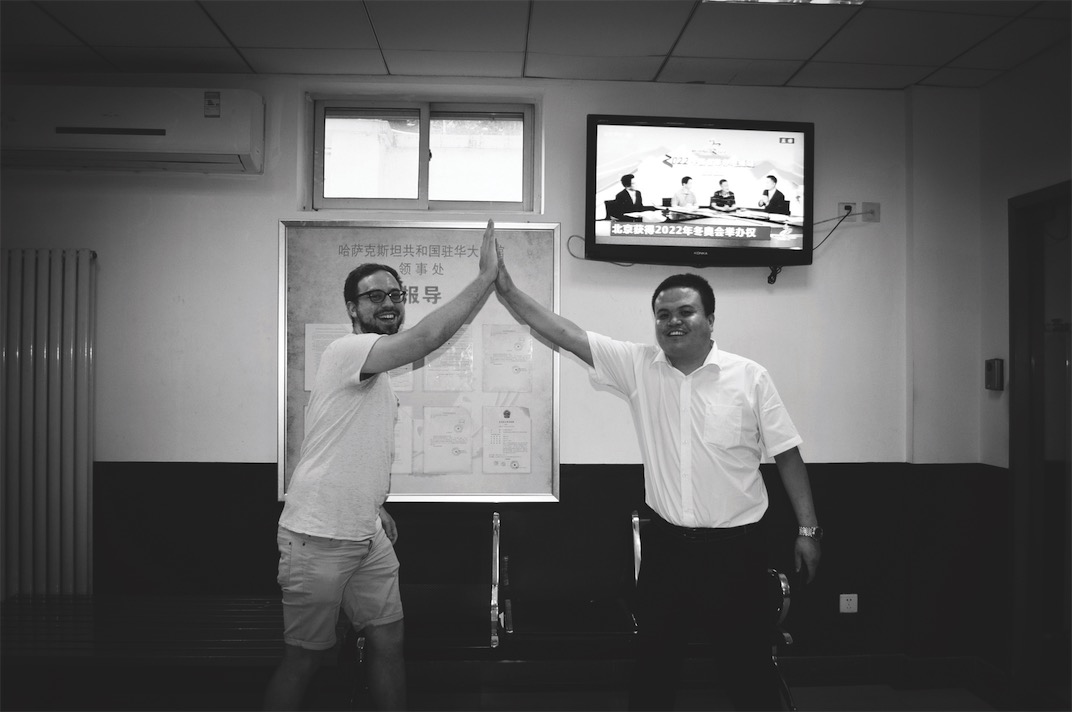





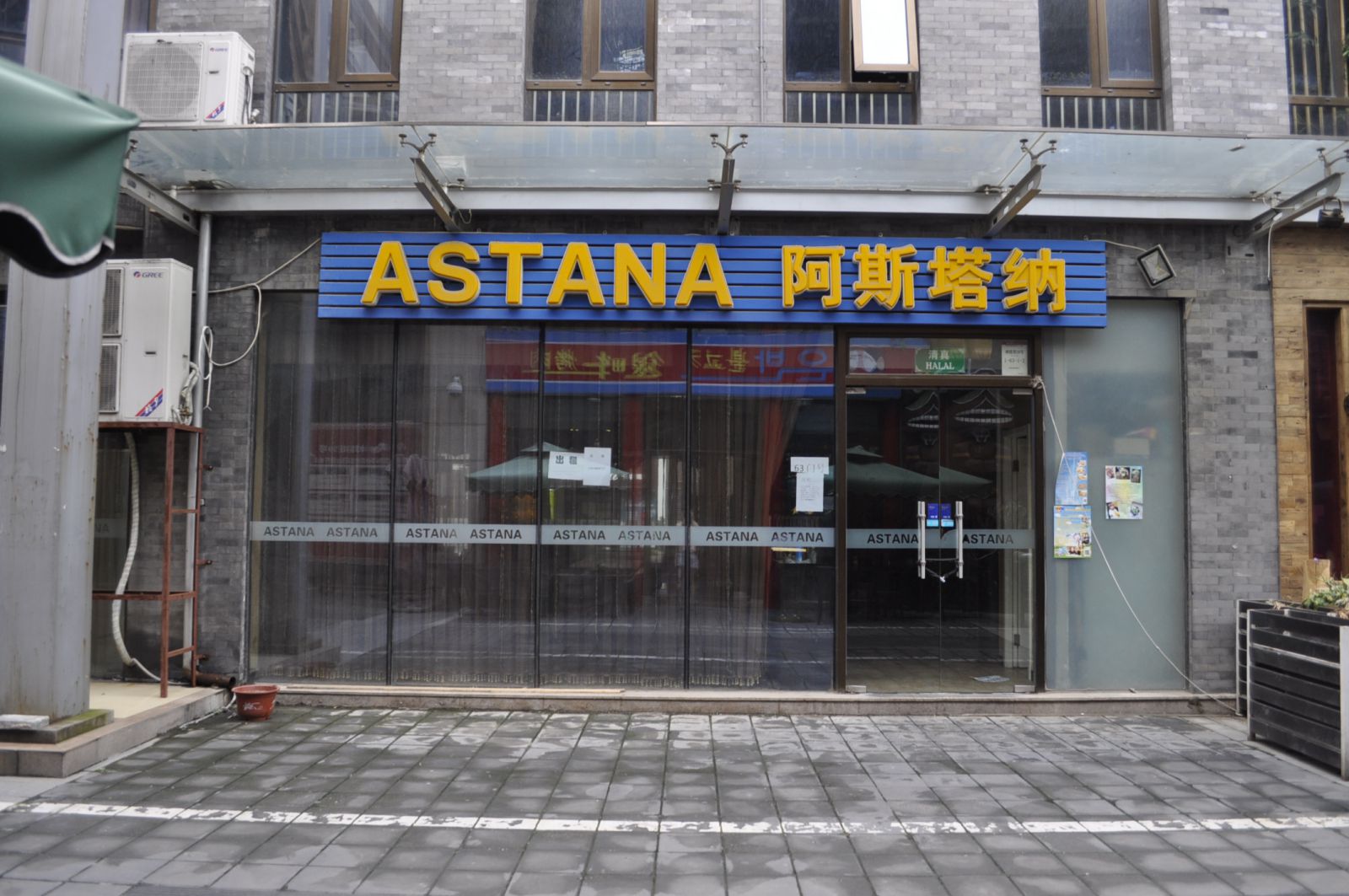

















0 User Comments